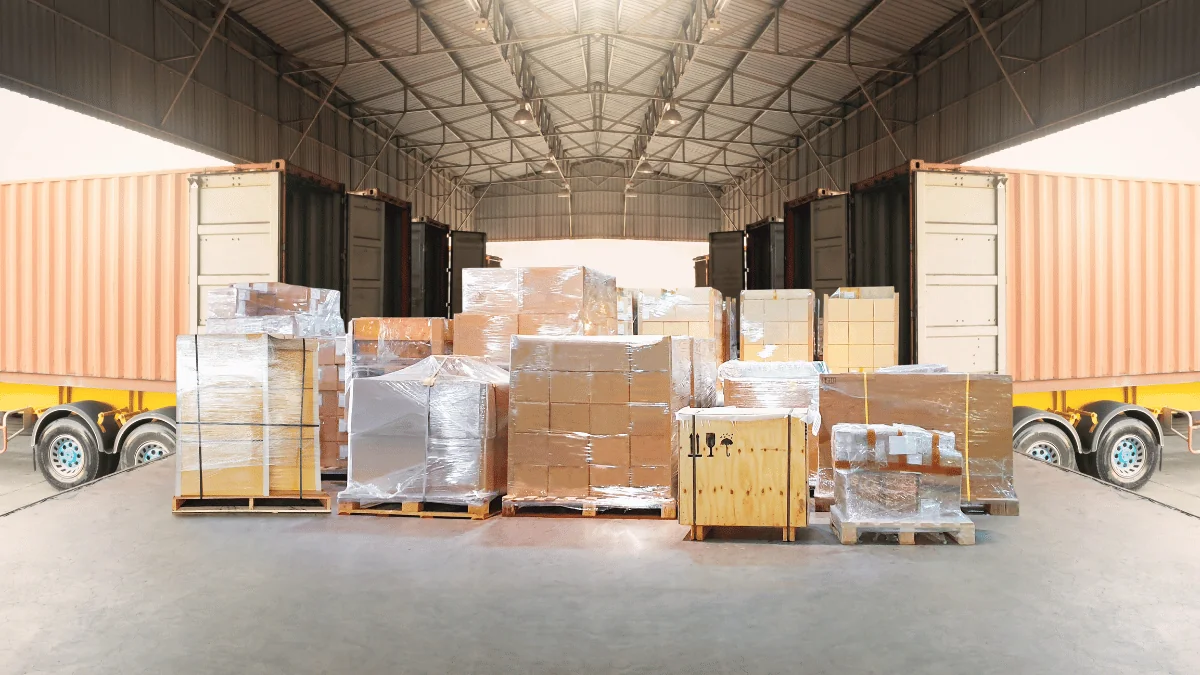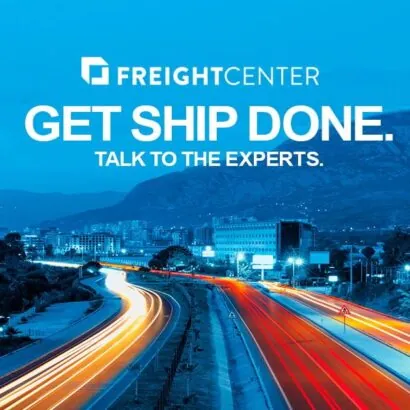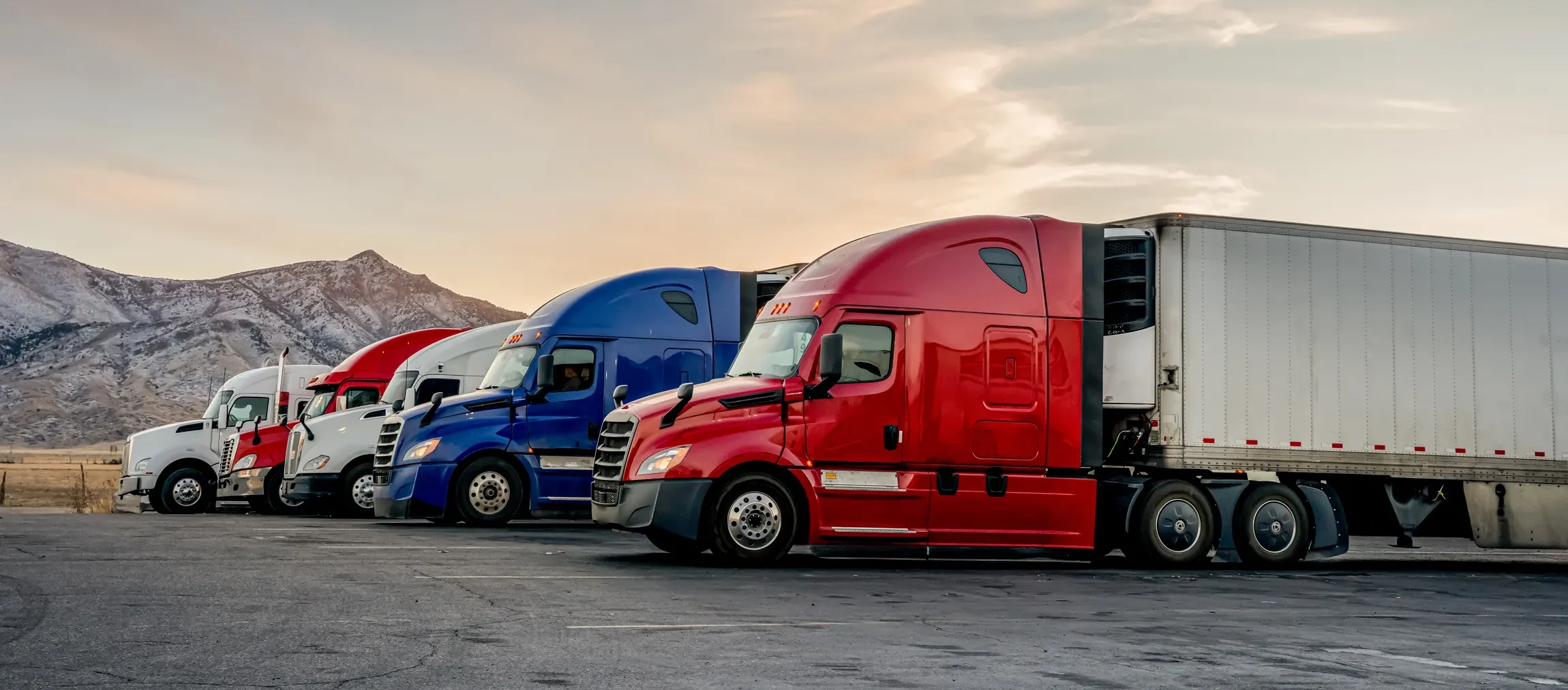
What is Freight?
The term freight can be defined as goods, items, or commodities weighing more than 150 lbs., requiring specialized transport methods.
What is Freight?
If you’ve ordered from Amazon, you probably have a vague idea of how package deliveries work. The customer orders, your item is packaged and put on a delivery truck or van, and your package is on your front step within a few days (maybe weeks if you didn’t order from an express delivery website).
But when you order stuff from Amazon, the package is usually small, or at least enough to where one person can carry it to your front step. What do you do when your package is something like long steel pipes? Or how about a bronze horse statue or a grocery store worth of food and beverages? These items can’t usually be delivered by the usual delivery companies, like Amazon, FedEx, or UPS, and involve lifting heavy or fragile goods from one place to their destination. These items are what we call freight.
Freight refers to oversized items or large quantities delivered in bulk through various transportation methods. These modes include train, ship, plane, or truck, with the last one being the most common. There are many ways to ship your items by freight, depending on your shipment’s quantity and fragility. Freight shipping is a major part of the logistics industry; we wouldn’t have all the products on the shelves at a store or delivered to your home without teams of workers, drivers, and carriers moving freight around the country and worldwide.
Learn more about freight and how it works below.
We provide competitive freight shipping prices and an all-inclusive, easy-to-use shipping experience for our customers. Exceeding our customers’ expectations results in thousands of satisfied customer reviews and repeat business. We believe in the power of our customer relationships. Check out FreightCenter reviews from real customers, and learn what they have to say about their freight shipping experience!
- 2021, 2017 & 2016 Food Logistics’ Top Green Providers
- 2021 & 2018 Supply & Demand Chain Executives’ Pros to Know: Matthew Brosious
- 2020 & 2019 Top Food Logistics’ 3PL & Cold Storage Provider Award
- 2020 & 2019 Business Observer’s Top 500 Companies on the Gulf Coast
- 2020 & 2017 SmartWay® Transport Partner
- 2020 & 2017 Food Logistics’ Champions: Rock Stars of the Supply Chain
- 2020 Best of Palm Harbor Awards for Local Businesses
- 2017 Green Supply Chain Award from Supply & Demand Chain Executive
- 2017 Tampa Bay Business Journal Heroes at Work
- 2016, 2015, & 2012 Food Logistics Top 100 Software and Technology Providers
- 2013 Tampa Bay Business 100 by Tampa Bay Business Journal
- 2013 Top 100 Great Supply Chain Partners by SupplyChainBrain
- 2012 TIA Samaritan Award Honorable Mention
- 2012, 2011 & 2010 TBBJ Fast 50 Recipient
- 2013, 2011, & 2010 Diversity Business Top Businesses

Why Choose FreightCenter for Freight Shipping?
Expertise in Freight Shipping: With over 25 years in the logistics industry, FreightCenter is dedicated to guiding you through the entire logistics process, from beginning to end. Our goal is to make freight shipping easy to understand and book. Don’t waste time researching and receiving quotes from individual carriers- FreightCenter’s got your back!
Competitive Rates with Tailored Solutions: We prioritize high-quality customer service without breaking your wallet. We utilize our relationships with regional and national carriers to offer you competitive, affordable rates while providing personalized solutions to your needs. Need a liftgate? We got you! Want to expedite your order? Leave it to us! We’re ready to provide tailored solutions that don’t compromise your freight shipment.
Personalized Customer Support: FreightCenter is committed to satisfying our customers. Our friendly customer support team is here to help you every step of the way, from initial inquiries to post-shipment concerns. We handle all aspects of logistics, including tracking, paperwork, and communication with carriers, so you can focus on your business while we manage your shipment. Choose us for our reliable service and affordable quotes!
What’s The Difference Between Freight and Parcel?
Parcels are a good or small collection of goods packaged and delivered by mail. Freight and parcels are often mistaken because they are both shipping types. Here are some common misconceptions to give you a better understanding:
- Freight is the shipment of large products or large amounts of items, often more significant than 150 lbs. At the same time, a parcel is a shipment of one or many individually shipped packages weighing in at less than 150 lbs.
- Freight delivery is curbside without moving assistance. Your package will not be brought up to you or brought inside unless booked at shipping. If you need those services, you would want to learn more about white glove delivery or inside delivery. On the other hand, a parcel is brought to the mailbox or doorstep and often hand-delivered to you. You can customize where your item is dropped off, like at your back door, porch, or parcel locker.
- Freight delivered via semi-trailer uses larger trucks, restricting certain shipping areas, such as areas with tricky turns, gates, small streets, etc. Smaller trucks deliver shipments with parcels, making it easier for the driver to maneuver through limited access areas.
- To deliver freight, carriers may need to utilize accessorials, which are additional services to help deliver the cargo. This includes items like a liftgate attached to the back of a truck to lift freight from the ground up to the trailer, or white glove delivery, which has carriers handle items with extra care and attention. Parcels don’t require additional help or services since they are easy for drivers to carry and deliver.
Parcels usually start as part of a bulk of goods in a freight delivery; they are delivered from a manufacturer or supplier to a fulfillment center or warehouse facility, waiting until a customer orders a specific commodity. The good is then packaged into a parcel (insulated bag, box, or case), labeled, and shipped out as a regular parcel delivery.
There are specific goods, however, that absolutely cannot be shipped by a parcel delivery service. These oversized items may need special handling and equipment, such as a flatbed truck or multiple escorts.

Types of Freight Shipping Transportation Modes
Freight can be shipped via four transportation modes: rail, ocean, air, and truck.
Rail: Freight can be shipped on a train. Unlike passenger rail (which includes railroad companies like Amtrak), freight rail consists of several class-level railroad companies that travel on rail lines throughout the country to transport freight. They may have lines running through ports or terminals that allow for switching, intermodal services, or transloading. The Class 1 railroads are the most famous freight railway companies, including Union Pacific, Burlington Northern Santa Fe (BNSF) Railway, CSX Transportation, Norfolk Southern, and Canadian Pacific Kansas City.
Ocean: Freight transported on ocean vessels is put inside metal rectangular boxes called containers. These containers can keep items safe and secure during transport, which can take months to go from one port to another. Once a container reaches shore and completes customs clearance, it can be stored on the port until the receiver is ready to have it delivered, or it can be shipped by rail or truck to a distribution center to be broken down and shipped in new shipments or shipped directly to the receiver.
Air: Freight can be transported by air via a cargo airplane or drone from domestic and international destinations. This is the fastest way to ship freight, since it only takes hours for a cargo airplane to go from point A to point B. This is also how parcel packages are delivered long distances, so many parcel delivery companies have air cargo divisions such as FedEx and UPS. This is also an expensive way to send freight since it’s being expedited.
Truck: This is the most common method of domestic freight transportation. The typical truck used to transport freight is the semi-trailer, a large rig attached to a trailer. Other types of trucks can transport loads if the load is not suited for the average semi trailer, such as flatbeds, step decks, refrigerated (reefers), and lowboys. This is also the least expensive transportation mode, though it also has different options for shipping your freight on a trailer (see below for details).
Shippers can choose to use one or a combination of these modes of transportation. If used in combination, it is called intermodal shipping; for example, an item can start on an ocean vessel in a container and then be loaded onto a train to be transported to a terminal; the loads are then sorted and loaded into trucks to send to their final destination. This creates an optimized shipping route that reduces wasted miles and shipping costs.
To create value for our customers by delivering customized shipping solutions that meet their unique needs and to fulfill shipping demands from simple to complex with expertise, guidance and ingenuity.
Rail shipping is a cost-effective and environmentally friendly transportation method that utilizes trains to move goods over long distances. It's known for its efficiency in handling large volumes of cargo, making it a sustainable and economical choice for businesses seeking reliable freight transport options.
Expedited shipping is a premium service designed to meet urgent delivery needs. It prioritizes speed and quick turnaround, ensuring that packages or goods reach their destination faster than standard shipping options. Expedited shipping is the go-to choice when time-sensitive deliveries are essential, providing businesses and individuals with reliable and prompt service for critical shipments.
White glove shipping is a premium service that goes beyond standard delivery, offering meticulous handling, specialized packaging, and in-home setup or installation for valuable or delicate items, ensuring a seamless and hassle-free experience for customers.
Less than truckload (LTL) shipping is a smart logistics solution for businesses with smaller shipments. It combines multiple smaller shipments into a single truckload, optimizing space and reducing costs. LTL shipping offers affordability and efficiency while ensuring timely delivery, making it an ideal choice for companies looking to save on transportation expenses without compromising on service quality.

Frequently Asked Questions about Freight

Q. What is freight shipping?
Freight shipping, or cargo or freight transportation, refers to transporting goods, commodities, or merchandise by land, air, or sea. It involves the movement of large quantities of goods from one location to another, typically using specialized carriers or freight services.
Q. How does freight shipping differ from other shipping methods?
Unlike traditional parcel shipping, which is typically used for smaller, individual shipments, freight shipping is designed for more extensive and heavier loads. Freight shipments often require specialized handling, equipment, and documentation due to their size, weight, and volume. Additionally, freight shipping is commonly used for commercial or industrial purposes, such as transporting goods between manufacturers, distributors, retailers, or consumers.
Q. What are the different modes of freight transportation?
Freight can be transported using various modes of transportation, including trucking (road freight), rail freight, air freight, and ocean freight. Each mode offers distinct advantages and is chosen based on the destination, transit time, cost, and nature of the goods transported.
Q. What factors influence the cost of freight shipping?
Several factors can influence the cost of freight shipping, including the weight and dimensions of the shipment, the distance traveled, the mode of transportation used, the shipping speed or service level selected, any additional services required (such as insurance or specialized handling), fuel prices, market demand, and regulatory compliance costs. Understanding these factors can help shippers estimate and manage their shipping costs effectively.
3 Advantages of Using FreightCenter for Freight Shipping

25+ Years of Service
We have over 25 years of experience, as evidenced by our large network of professional carriers. Our knowledgeable team of shipping experts is ready to help you optimize your shipping experience.

Customizable Shipping Options
Need a liftgate? No problem! Need to ship your products quickly? We got you covered! Our FreightCenter agents can offer tailored solutions for your specific shipping needs while offering affordable rates you can’t find anywhere else.

Friendly Customer Support
Our customer support team has the answers to many of your shipping questions and concerns. We’re here to help you through every step of the shipping process, from initial inquiries to post-shipment issues.


